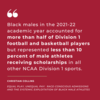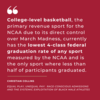The ban on race-conscious admissions practices is atrocious in many ways. One grotesque result? It hampers mobility for Black men to access an affordable postsecondary education. However, there’s a loophole that has been manipulated by the system for ages: college athletics. In a tale as old as America, institutions routinely economically exploit the physical labor primarily performed by Black men who are unable to be legally recognized as employees. That means they can’t collectively bargain or advocate for better working conditions or even better compensation. What’s more, they are often not provided with necessary academic and student support, which belies colleges’ alleged desire for them to be students first, athletes second.
In the report “Equal Play, Unequal Pay: Race-Conscious Admissions and the Systemic Exploitation of Black Male Athletes,” The Center for Law and Social Policy’s (CLASP) policy analyst Christian Collins shines a much-needed spotlight on this exploitative and racist status quo. He uses publicly available data from the National Collegiate Athletics Association (NCAA) and its member institutions to show how college athletics have disproportionately been used by selective institutions to enroll Black men, and how allowing such trends to continue in the wake of the Supreme Court’s 2023 rulings will only continue to harm Black men.
We sat down with Collins to discuss his latest report, his college experiences, the weaponization of masculinity, and how policymakers and colleges can better support black men.
In the report, you outline how the term “student-athlete” has been used to deny students compensation and rights as workers. What changes to the language can we make to start to better discuss athletes attending college?
Other researchers refer to them as “athletic workers” or “campus athletic workers” to really drive home that tie that their participation in athletics is physical labor and should be recognized as such.
That’s one of the points of conflict in discussing these issues: people don’t see athletics as labor.
It mirrors other industries in this country as well—it’s like what we’re seeing with SAG-AFTRA or the voice actors in video games strike. People don’t see professional musicians or artists as performing labor, it’s just a cool hobby to them.
Especially in the context of this paper, going back to the history of the role bestowed upon Black males in the American economy—they were chiefly valued at first for their physical labor, being brought over for chattel slavery. But it wasn’t recognized as honest labor, they were quite literally slaves.

One of the quotes that stands out from the report is Walter Byers' reflection that he created a ‘neo-plantation’ system where coaches and universities ‘own’ the bodies of athletes and hold sole possession of the financial windfalls they generate.
What’s your take on that, and broadly, of this legacy of American racism?
It’s a surprisingly powerful acknowledgement of the role that the NCAA played over time—especially coming from their former president, Walter Byers.
Observationally, being a longtime fan of collegiate athletics, most of the popular media conversations around college athletics have no concern for the actual “student” part of the “student-athlete” term. This is especially true of the “revenue sports”—mostly made up of Black men—where the assumption is that these guys aren’t there for classes, they’re all going to go pro and be millionaires.
I went to Ohio State—one of the largest college athletics programs in the country. Being a Black man on that campus, it’s automatically assumed that you’re an athlete.
That quote helped piece things together. Even though labor rights and college athletics have been discussed together for quite some time, tying some of those decisions to the recent SCOTUS decisions on race-conscious admissions was a bit of a newer prospect. This is the former head of the NCAA itself saying, “This is a neo-plantation system; this is how it should be seen moving forward.”
What is college culture like for Black men, both those involved in sports and those that aren’t?
I wasn’t a varsity athlete myself—I did some club athletics my senior year, but that’s on a different scale.
It was mostly a matter of a lack of seeing other people that look like me around campus. Ohio State is annually top 5 in student population with over 60k students on campus, but there are not a lot of Black men.
It was especially striking [when] the day before graduation there was a separate ceremony held by a lot of the African American student groups and research centers on campus in recognition for specifically African American graduates in the class. Looking around, there weren’t a lot of men, to be honest.
It’s not necessarily a bad thing that it’s mostly women, but it just feels under-evaluated as to why exactly there is such a lack of Black men especially at selective institutions.
Most of the numbers investigating the drop-off in enrollment of Black men center around community colleges—that’s kind of a whole separate conversation about the true purpose of postsecondary education, and specifically, who gets to have what experiences. For Black men, it tends to be directly learning skills for the labor force rather than having the privilege and access to a traditional liberal arts education.
I drew upon this personal experience for the report—evaluating the lack of other people that look like me on campus. Those that did tended to be only visible in social environments like athletics and the frats or labor environments like on-campus frontline workers, but less so in the academic environment. There should be a lot more people that look like me at a huge university like that.
I drew upon this personal experience for the report—evaluating the lack of other people that look like me on campus. Those that did tended to be only visible in social environments like athletics and the frats or labor environments like on-campus frontline workers, but less so in the academic environment. There should be a lot more people that look like me at a huge university like that.

Christian Collins
Policy Analyst at The Center for Law and Social Policy
Why aren’t these colleges enrolling more Black men?
Regardless of the individual institution, there’s a macro-level lack of prioritization in enrolling Black males except in athletics—particularly athletics that generate a lot of revenue for these universities.
The ratio of enrolled Black students to enrolled Black athletes across certain groupings should not be changing year to year. The top number of that fraction, which is Black male athletes, should not be changing drastically. There’s an upper limit because of scholarships. No matter what, even if every member of a college’s football team is Black, that’s only 85 scholarships. That number stops there for what the NCAA officially counts.
So, any significant changes in that year to year are coming from the bottom number, as far as the total number of Black males enrolled.
[T]hat’s what I’m trying to get at in the paper: the fact that the bottom number is so low, and the fact that the ratio experiencing significant changes year to year is a serious problem and a serious indication that these institutions are not living up to their mottos as equalizers or engines of economic mobility.
For certain universities in states that have already banned race-conscious admissions, there is a trend that is only getting worse—it goes back to the question, “Who has the right to access certain types of education?” across the country.
We see that colleges are not only failing to enroll Black men, but as you said, failing to graduate them. Why do you think that is?
My belief is that it’s either a lack of acknowledgement of the unique factors and difficulties that Black men experience in higher ed—not just accessing it but maintaining status and participating in it—or just a lack of support in addressing those factors.
Black men are often more in need of economic support because they have less family income to rely on, especially with outside expenses. They’re more likely to rely on loans and rack up high figures of debt pursuing education. They are more likely to need services such as transportation support, child care, and medical insurance.
All of these factors attack the ability for Black males to complete their education programs at different angles. It gets to a point where a lot of them may feel like, “I can’t do this anymore,” or “Why am I putting myself through this struggle?”
Even the economic prospects of Black males who do graduate are significantly more dismal than graduates of other races, or even members of the labor force of other races who have no postsecondary education.
Postsecondary education is marketed as a way to make more money and support your family. That’s not really the case for Black males, so some tend to ask, “Why am I even doing this?” and drop out and get a job or learn a trade where they can make money immediately.
Black men are often more in need of economic support because they have less family income to rely on, especially with outside expenses. They’re more likely to rely on loans and rack up high figures of debt pursuing education. They are more likely to need services such as transportation support, child care, and medical insurance. All of these factors attack the ability for Black males to complete their education programs at different angles.

Christian Collins
Policy Analyst at The Center for Law and Social Policy
How does this relate specifically to Black students doing athletic work?
The case specifically for Black men who participate in college athletics is that there’s not really a large-scale emphasis on the student aspect of their participation. Individual programs have initiatives that are designed to increase graduation rates for participants, but wide-scale, that’s not the case—especially for revenue sports. The goal is to generate money. And that comes from maintaining eligibility and health, enough that you can play.
In the paper, I go into this—especially my points about hyper-surveillance toward the end of the paper. Companies and schools are developing all of these ways to monitor athletes all the time. They’re treating them as marketing commodities instead of human beings.
Schools track athletes’ personal social media accounts. They track them across campus and class—sometimes using apps to know their location at all times. All of this is on top of the regular student schedule, and the college athlete schedule of working out and having to do conditioning, practices, and film study.
The difficulties for Black male non-athletes are not exclusive to them, either. Black male athletes face food insecurity and child care issues too. And athletes may have even more challenges meeting those needs, because the assumption is that the university is taking care of them because they’re getting a “full ride.” The scholarships do not cover every cost associated with postsecondary education. Tuition dollars are cool, but they’re not child care.
The vast majority of college athletes who aren’t nationally famous and on TV all the time aren’t having all of these services covered in their NIL contracts, if they’re even getting them, because most athletes don’t.
Overall, Black men athletes tend to graduate at slightly higher rates than the overall Black male population for NCAA Division 1 schools. But going into specific programs, some are abysmal at graduating their athletes. It’s clear they’re being treated as commodities.
They’re saying, “We’re going to use you until you transfer, you make the league, or you get hurt—and then we’re going to spit you out and take the next high school recruit and do the same thing.”
In the report, you say that the societal expectations of masculinity are weaponized against Black men. How does that manifest in Black men in collegiate athletics and within higher ed in general?
Specifically for athletics, the obvious manifestation in my and many of my peers’ experience growing up is going to coaching staff about an injury or telling them you’re going through a rough time—a lot of coaches will use toxic expectations of masculinity to bully you into performing. Here are some examples of derogatory and sexist things I’ve heard said either to myself or teammates:
“You’re too soft to go out and compete.”
“You’re a p***y.”
That’s even more evident in college athletics. When there’s money involved, there’s an emphasis on making sure you’re out on the field without any regard to whether you should be doing that.
For Black men in general, or really men in general, it’s weaponized to prevent them from being fully able to express their humanity. Societal expectations of masculinity dictate that you’re only really allowed to experience anger and aggressive confidence. There’s not an emphasis on men being fully human.
That weaponization of masculinity is evident on every side of the political spectrum. The lack of acknowledgement allows bad-faith actors to come in and use those valid feelings that men experience to produce horrific results—like the popularity of content creators like Joe Rogan and Andrew Tate. There [are] specific variations of these for Black men too.
Many men don’t have a place to express things outside of the “traditional emotional spectrum of masculinity.” They don’t have a place to accurately express how they feel as humans.
A lot of what I want to do with my research is to counter those effects by spotlighting more of the unique socioeconomic factors that Black men experience.
Similar to how Black men are only prioritized at selective institutions for athletics, in public policy conversations, Black men are only really prioritized when the conversation is criminal justice reform or when it’s election year. Outside of that, there’s no prioritization of Black male experiences in public policy—especially in labor rights and health.
These voices have to be heard and accurately represented in policy conversations. You should be using your voice to help those who don’t have that if you’re in a position of power. This country has never allowed Black men to hold a societal position of power.

What’s the most important thing we could do to support Black men or Black male athletes in higher ed?
The most important piece would be redirecting support from all levels into institutions that actually meet the task of being strong pathways for upward social [and] economic mobility for marginalized populations.
The reason why the issues I highlight in the report are issues at all is because of the overwhelming resource advantage that some institutions of higher education have that don’t serve marginalized populations.
MSIs, HBCUs, and community colleges more commonly enroll students from lower income groups and marginalized populations. Because of that, especially for HBCUs, there are certain professions dominated by HBCU graduates despite there only being about 100 HBCUs in the US. They have this outsized proportion of Black graduates but they’re not receiving the level of support that they should be.
We need to reframe how we think about the role of postsecondary education in this country, especially for marginalized populations.
Institutions that actually do the work should be rewarded for doing so, their practices should be adopted, their administrators should be interviewed about their tactics and practices and blasted everywhere in the media. That’s my number one wish for Black men in general.
For Black athletes in particular, the solution is recognizing them as employees and granting them the right to collectively bargain. The only difference between athletes on campus and other workers on campus is that athletic work isn’t seen as real work—and they aren’t given the legal status that comes with employment. It makes no sense that athletes don’t have any rights, aren’t getting paid, and aren’t getting treated as employees by the university. There’s an unwillingness to provide that status because they’re primarily Black men.

What can basic needs staff at colleges and universities do to better support Black men athletes?
First, acknowledge the complications—like gender discrepancies in willingness to reach out to support staff-—especially [for] athletes, who, as noted, are often isolated in environments of toxic masculinity.
When you do reach out to athletes, make sure they have the support they need and encourage them to break free from those societal expectations. Also, be willing to stand up to athletic staff that may be putting pressure on athletes to “just shut up and dribble” because they need them on the court.
What can college sports fans do to better support Black men athletes in college?
Build public pressure on these institutions to recognize athletes as employees. The fans are the money. The most powerful way for the public to message on this issue is for us to vote with our wallets—whether that be not supporting programs that don’t value their athletes as employees, or that have bad track records of graduating their athletes.
The public should amplify messages like Coach Jim Harbaugh’s call to unionize college athletic workers.
For Black athletes in particular, the solution is recognizing them as employees and granting them the right to collectively bargain. The only difference between athletes on campus and other workers on campus is that athletic work isn’t seen as real work—and they aren’t given the legal status that comes with employment. It makes no sense that athletes don’t have any rights, aren’t getting paid, and aren’t getting treated as employees by the university. There’s an unwillingness to provide that status because they’re primarily Black men.

Christian Collins
Policy Analyst at The Center for Law and Social Policy
There’s a lot of power in the community to put pressure on not just institutions, but legislators and policymakers as well.
In general, policymakers, alumni, fans, athletes, and their families must realize that the defining trait of college athletics is the farce of the “amateurism” label.
Educational institutions have for far too long operated college sports as a product fueled by unpaid labor and have managed to convince the public that this system of “amateurism” deserves policy and legal protection. Any other industry whose sole distinctive trait compared to the rest of its sector is that its labor force is unpaid and not recognized as legal employees would (ideally) be ruthlessly scrutinized.
Part of why college athletics hasn’t received the public scrutiny it has long deserved is because the primary beneficiaries of systemic reform would be Black men, and my research hopefully is a call of reflection and action as to the consequences of allowing this current system to persist.
Style Guide note:
While "black men athletes” might read grammatically awkward, The Hope Center recommends using "men" and "women" to describe students rather than "male" and "female"—biological terms that reduce students to their sex assigned at birth and perpetuate the gender binary.


